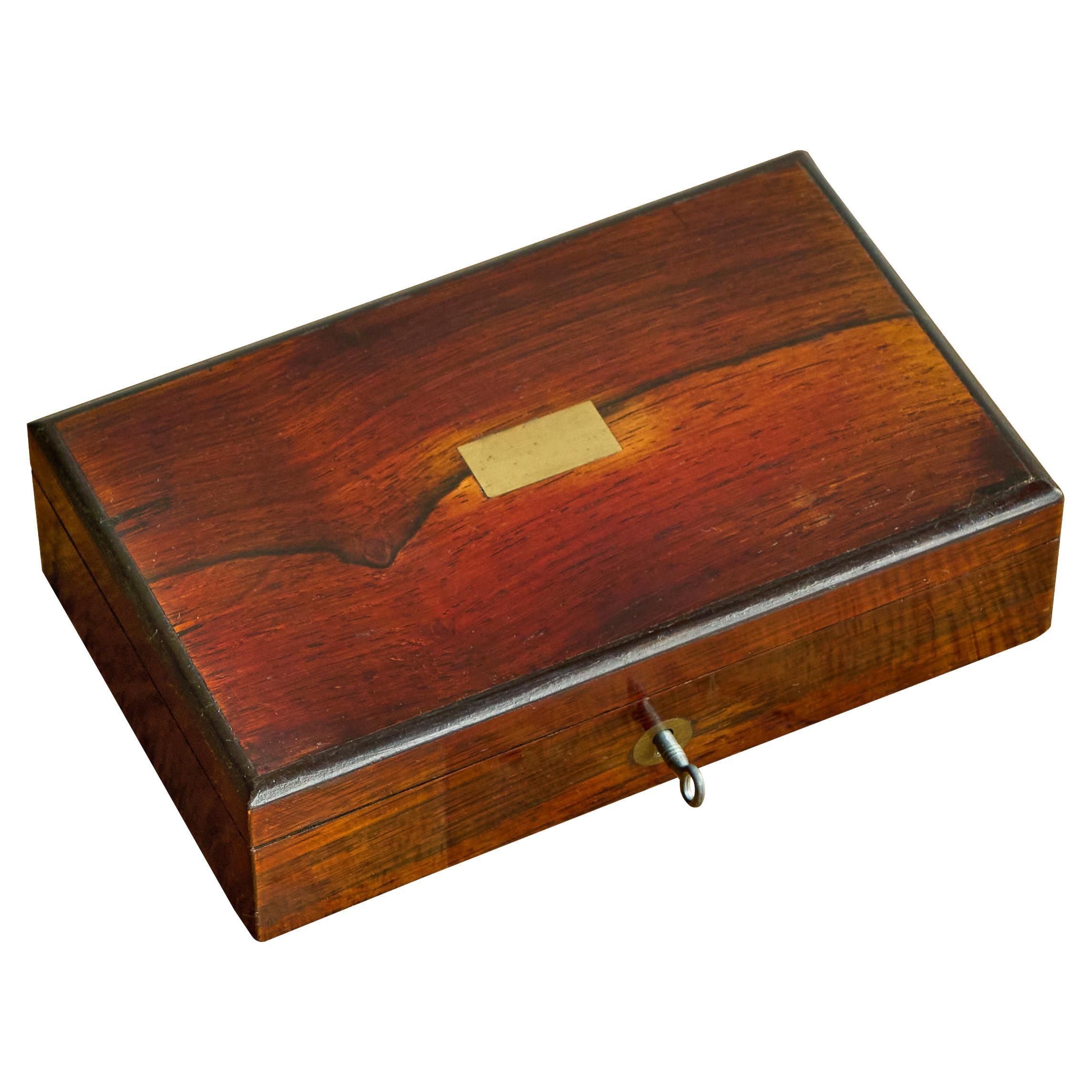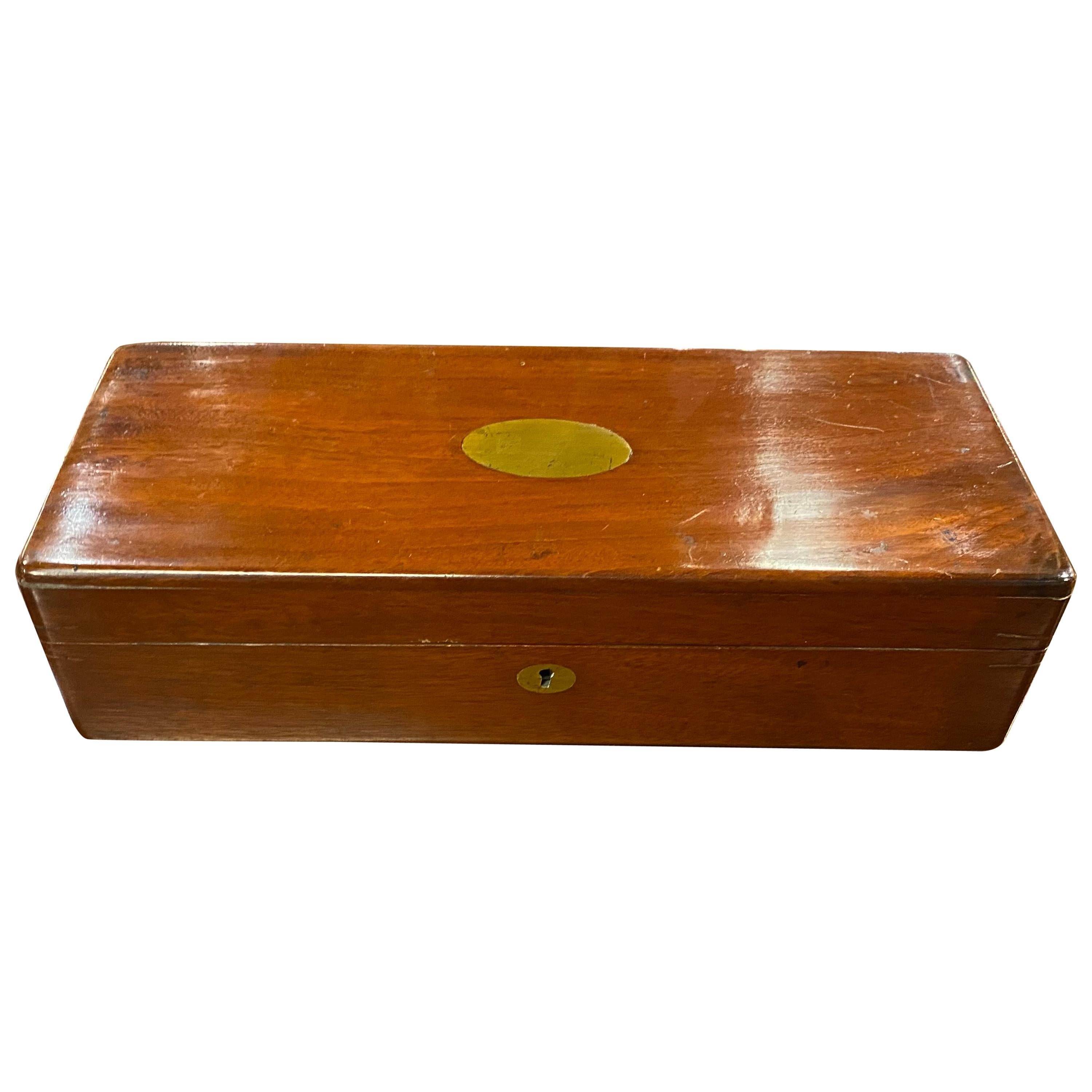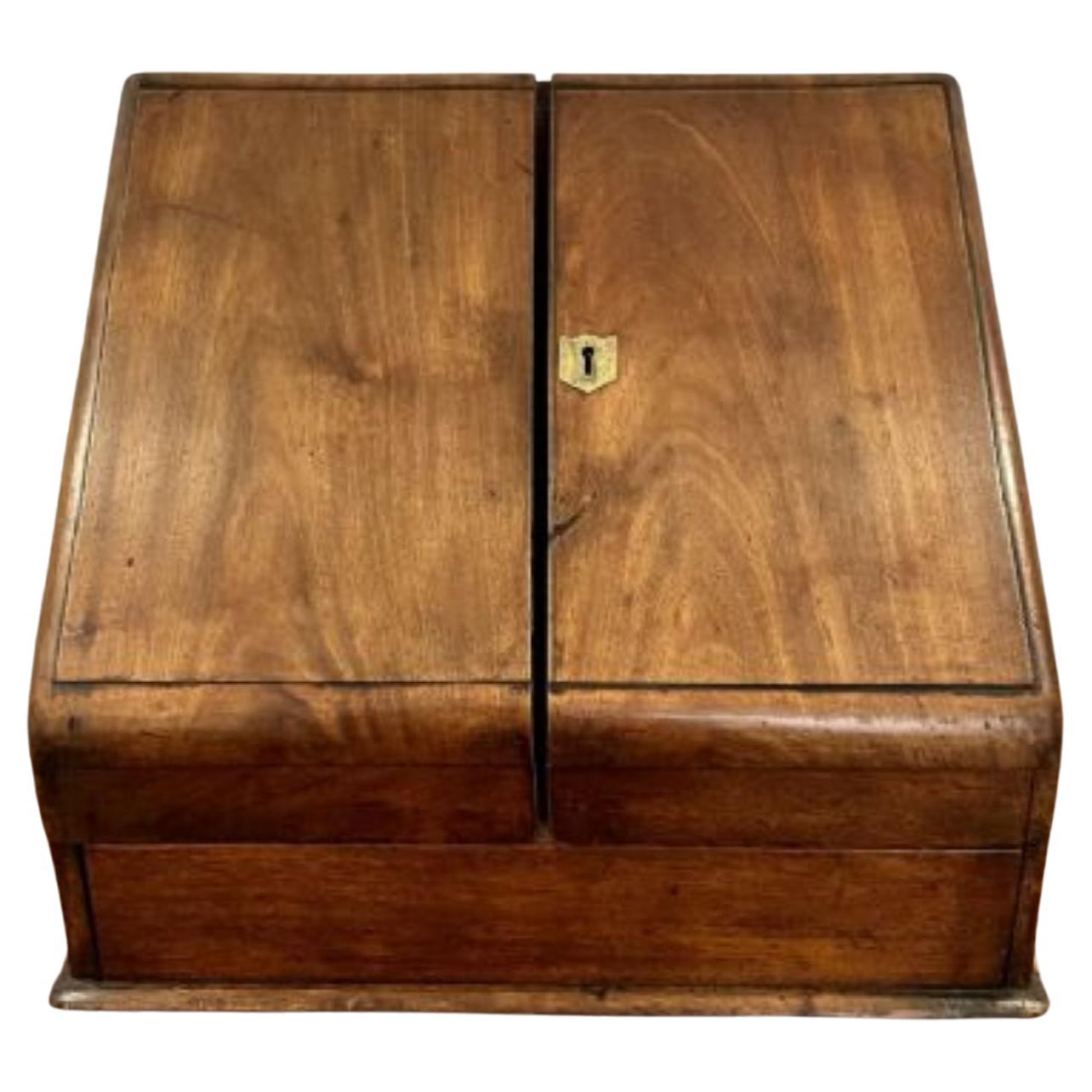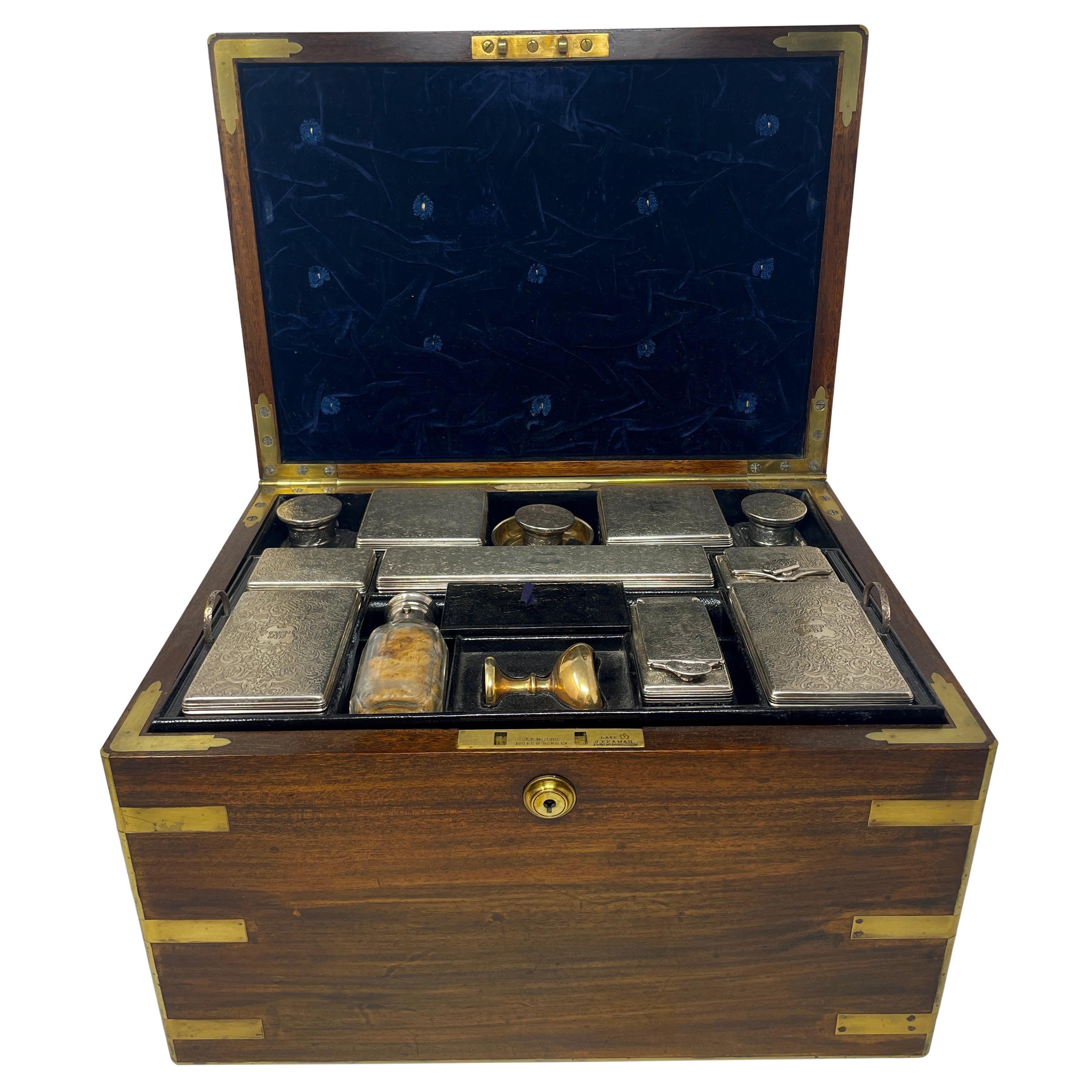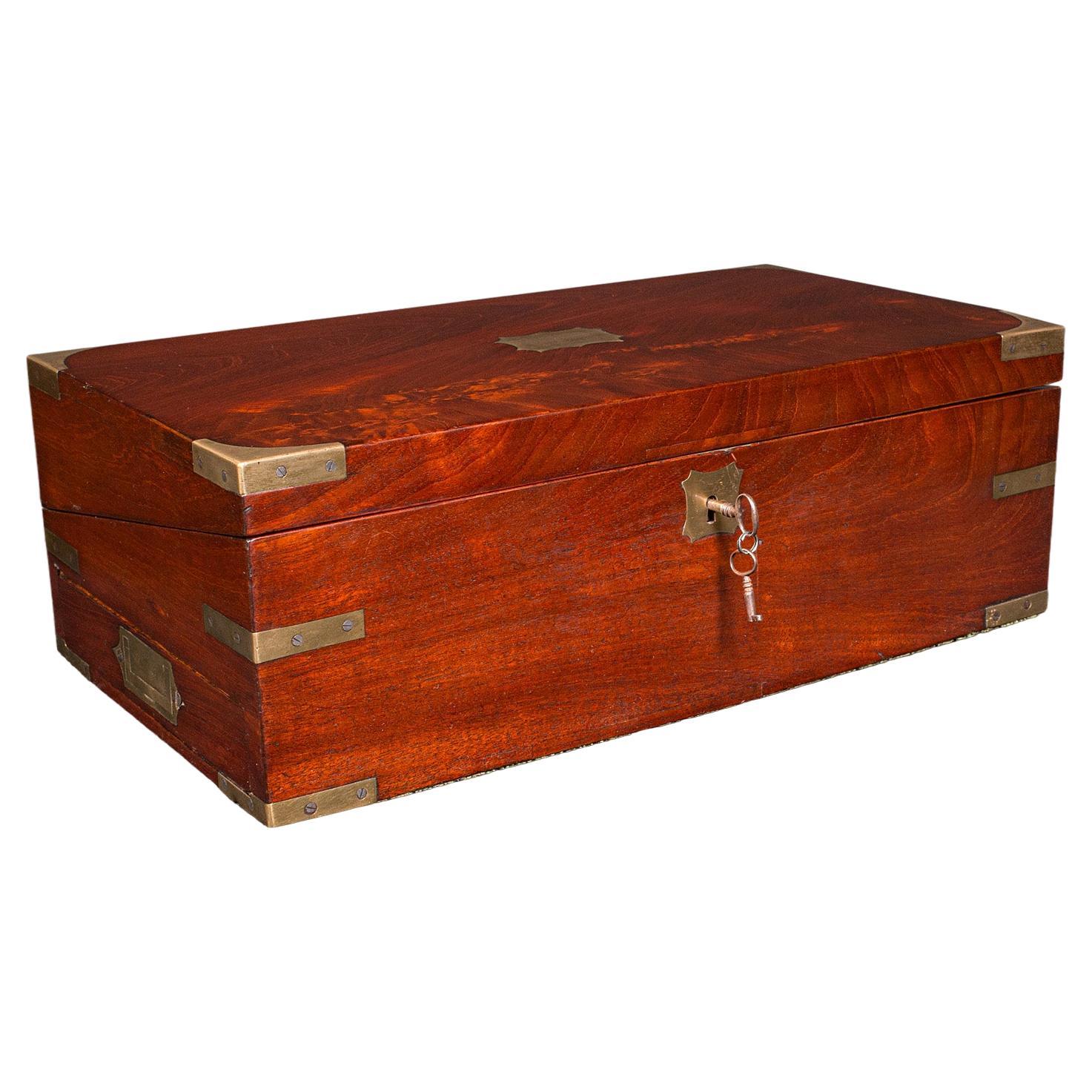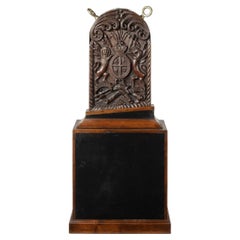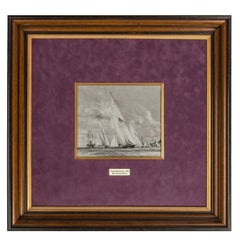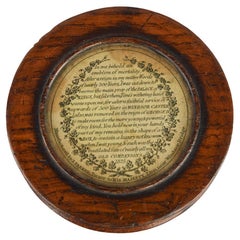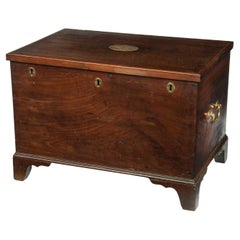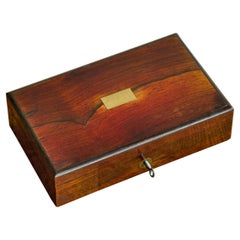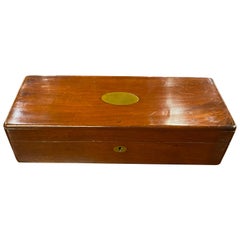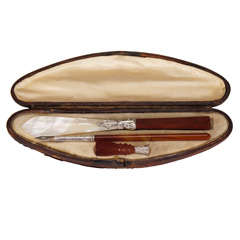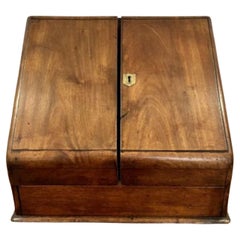Items Similar to Wilson Chilton’s mahogany Naval Architects/draughtsman box of curves/templates
Want more images or videos?
Request additional images or videos from the seller
1 of 13
Wilson Chilton’s mahogany Naval Architects/draughtsman box of curves/templates
$21,466.02
£15,750
€18,467.80
CA$29,614.25
A$32,932.27
CHF 17,296.74
MX$402,630.06
NOK 215,533.98
SEK 203,190.33
DKK 137,829.47
About the Item
Wilson Chilton’s mahogany Naval Architects/Naval draughtsman box of curves and templates, probably by Gillows still retaining around 100 superb quality small and large shears, two of them inscribed, the box of rectangular form with a hinged top, in fine quality mahogany with the T-square and straight-edge also executed in mahogany, a single drawer, with two original inset brass handles, opens at each end of the box, the interior retaining the original brass locking pin for the drawer, the inkwell (glass slightly damaged), period pen and old sealing wax (appear to be of the period.) One inscribed ‘October the 15 1820 The small moulds 56 Wilson Chilton’ and ‘Number of shear moulds 27 1820 October the 15’. English, circa 1820
Provenance: Formerly the property of Wilson Chilton shipwright
Wilson Chilton son of Richard Chilton and Elizabeth Wilson, born 24/12/1797 baptised 01/07/1798 in Bishop Wearmouth Co. Durham ( Sunderland south of the Wear). A directory of 1827 gives the address of 2 Low Street, Sunderland, on the Bishop Wearmouth shore.
1829 – 1840 Wilson Chilton appears to have had a shipyard in Sunderland. He was obviously an important name in the industry and clearly would become a serious player in the area as a ship builder.
June 1828 He was one of ten partners in Leithead & Co. Shipbuilders. The London Gazette records the partnership as being dissolved.
24 December 1829 Chilton married Isabel(la) Kirton.
1841 A census described him as a shipbuilder living in Brougham Street, Bishop Wearmouth with his wife, two sons ,Wilson Jr and William, a daughter, his widowed mother, and his parents [sic]. He may well have owned property in that street.
4th July 1833. Wilson Chilton with six others formed a new company trading as Wilson Chilton & Co. This in turn was dissolved on
27th of April 1838. A new William Chilton & Co. was formed with three other partners and was later dissolved.
1851 was recorded as shipbuilder and employing 6 hands and 9 apprentices. A third son, Thomas was born, and his oldest son became an apprentice presumably under his father, his address was 50 Brougham Street, where he remained for the rest of his life.
1861, age 63 bankrupt and appears to be employed as a foreman shipwright. At that time his eldest son, Wilson Jr, was partner in a shipbuilding firm called Spowers and Co., which was dissolved 16/12/1868, and from which a new Wilson Chilton & Co. was formed.
Wilson Chilton Snr was not listed as having any occupation in 1871 and then in 1881 he is described as a landlord and is living at 50 Brougham Street owned by his son Thomas.
1881 25th of September Wilson Chilton died. Probate was granted to his four children and his personal estate was £10. He had probably conveyed property to his children.
1911 Willian Jr his son died as a working shipwright.
NB There exist several newspaper cuttings relating to Chilton and the ships he launched.
- Attributed to:Gillows of Lancaster & London (Maker)
- Dimensions:Height: 5.5 in (13.97 cm)Width: 39 in (99.06 cm)Depth: 16.75 in (42.55 cm)
- Materials and Techniques:
- Place of Origin:
- Period:
- Date of Manufacture:circa 1820
- Condition:Wear consistent with age and use.
- Seller Location:Lymington, GB
- Reference Number:1stDibs: LU973030803972
About the Seller
5.0
Recognized Seller
These prestigious sellers are industry leaders and represent the highest echelon for item quality and design.
Gold Seller
Premium sellers maintaining a 4.3+ rating and 24-hour response times
Established in 1982
1stDibs seller since 2013
133 sales on 1stDibs
Typical response time: 2 hours
Associations
LAPADA - The Association of Arts & Antiques Dealers
- ShippingRetrieving quote...Shipping from: Lymington, United Kingdom
- Return Policy
Authenticity Guarantee
In the unlikely event there’s an issue with an item’s authenticity, contact us within 1 year for a full refund. DetailsMoney-Back Guarantee
If your item is not as described, is damaged in transit, or does not arrive, contact us within 7 days for a full refund. Details24-Hour Cancellation
You have a 24-hour grace period in which to reconsider your purchase, with no questions asked.Vetted Professional Sellers
Our world-class sellers must adhere to strict standards for service and quality, maintaining the integrity of our listings.Price-Match Guarantee
If you find that a seller listed the same item for a lower price elsewhere, we’ll match it.Trusted Global Delivery
Our best-in-class carrier network provides specialized shipping options worldwide, including custom delivery.More From This Seller
View AllRoyal Naval Ship’s Elm Companionway Board
Located in Lymington, Hampshire
A Royal Naval ship’s elm companionway board, of rectangular form with an arched top and two sturdy brass rings, naively carved with a crowned coat of arms flanked by a lion and unicorn...
Category
Antique 1860s English Nautical Objects
Materials
Elm
Charles Dixon R.A. for King George V, Royal Yacht Britannia
Located in Lymington, Hampshire
This ‘en grisaille’ watercolour on paper is Charles Dixon’s preparatory sketch for a proposed but apparently uncompleted painting of the royal racing yacht Britannia...
Category
Vintage 1930s English Nautical Objects
Materials
Paper
A Rare and Historically Interesting George IV Period Snuff Box Made from Oak
Located in Lymington, Hampshire
This fine box is one of a small number of souvenir pieces of this kind made from timbers salvaged during the refurbishment of Windsor Castle in the 1820s. What makes this piece parti...
Category
Antique 19th Century English George IV Snuff Boxes and Tobacco Boxes
Materials
Oak
A mahogany strong box made for the Ovenden Female Society, Instituted May 1809
Located in Lymington, Hampshire
A mahogany strong box made for the Ovenden Female Society, Instituted May 1809, of deep rectangular form with a hinged lid, three brass locks, brass carrying handles and an applied b...
Category
Antique Early 1800s English Decorative Boxes
Materials
Mahogany
Frederick Chapman: ‘Naval Architecture War Vessels’, circa 1770
Located in Lymington, Hampshire
FREDERICK CHAPMAN: ‘Naval Architecture War Vessels’, circa 1770, , 50 engraved plates of various sizes depicting naval diagrams (numbered I-XXVI), four signed ‘F. Ringheim’and one ea...
Category
Antique 18th Century Swedish Books
Materials
Paper
A Fascinating Ship’s Log And Journal Relating To The Whitway/Whiteway
Located in Lymington, Hampshire
A Fascinating Ship’s Log And Journal Relating To The Whitway/Whiteway Family of Bristol Mariners, Along With A Dispatch Letter From The Bureau in St Petersburg Relating to One Of The...
Category
Antique Early 19th Century Nautical Objects
Materials
Paper
You May Also Like
Antique Drawing Instrument Set in Rosewood Box 1900
Located in Meer, VAN
Antique Drawing Instrument Set in Rosewood Box, France, 1900.
A wonderful set of drawing instruments / calipers / compasses to draw and dr...
Category
Early 20th Century French Arts and Crafts Scientific Instruments
Materials
Metal
19th Century Box with Brass Plaque
Located in Toronto, CA
Rectangular 19th century box with an oval brass plaque without engraving.
The exterior has been re-polished over time. It has a nice warm patina. The int...
Category
Antique Late 19th Century English Late Victorian Decorative Boxes
Materials
Mahogany
Set of Desk and Writing Instruments in Fitted Leather Box, 19th Century
Located in Great Barrington, MA
This lovely three-piece 19th century writing set consists of a pen with silver tip, letter opener of mother of pearl with agate handle and silver connector and a detailed intaglio en...
Category
Antique 19th Century French Desk Accessories
Materials
Agate, Silver
Antique Victorian quality mahogany stationary box
Located in Ipswich, GB
Antique Victorian quality mahogany stationary box having a sloping front and a pair of mahogany doors opening to reveal a fitted interior, set ...
Category
Antique Early 19th Century Victorian Decorative Boxes
Materials
Mahogany
Antique English Coromandel Fitted Traveler's Box Compendium, Circa 1850-1860
Located in New Orleans, LA
Antique English Victorian Coromandel wood fitted traveler's box Compendium, Circa 1850-1860. Made by J.T. Needs, Late Bramah: Purveyor to Her Majesty, Prince Albert & the Royal Family.
Category
Antique Mid-19th Century English Victorian Historical Memorabilia
Materials
Crystal, Silver
Antique Officer's Campaign Correspondence Box, English, Writing Case, Regency
Located in Hele, Devon, GB
This is an antique officer’s campaign correspondence box. An English, flame mahogany and leather writing case, dating to the Regency period, ...
Category
Antique Early 19th Century British Regency Desk Sets
Materials
Leather, Wood
More Ways To Browse
Naval Furniture
Naval Ship
Lock Of London
Wilson Antique
Mahogany Curved Glass
Record Player Furniture
Shipyard Furniture
Gillow And Co
Antique Sunderland
Antique Shears and Scissors
Antique Straight Pins
Vintage Record Players
Thomas T Wilson
Chilton Furniture
Antique Hand Pump
German Santa Claus
Mid Century Christmas Ornament
Signing Declaration Independence
